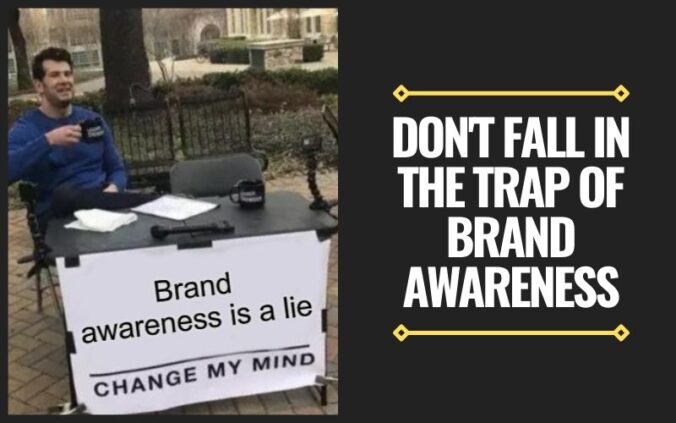In the last few years, “brand awareness” became one of the most popular buzzwords in the digital marketing world. Every week, I receive marketing emails from digital consulting agencies telling me how they can help me “build brand awareness” or “increase brand awareness”. That sounds great on paper, and I think brand awareness can be a positive thing. However, what I’m seeing is that the necessity of building brand awareness has become overblown, especially for small niche businesses on a limited marketing budget. I wish I had time to ask these marketing agencies what they mean exactly by “increasing brand awareness”, and I suspect some of them are preying on businesses with limited knowledge of marketing strategy.
What is Brand Awareness?
Let’s break it down. What is brand awareness exactly? Here is how Wikipedia defines it :
“Brand awareness is the extent to which customers are able to recall or recognize a brand under different conditions.”
Simply, it tells you how familiar customers are with your brand. “But François, of course I want my customers to recognize my brand. What’s the problem?” Let me give you a quick example to illustrate what I mean.
Coca-Cola is the king of brand awareness, with literally billions of people all over the world who recognize the Coca-Cola logo. This giant company spends on average 4 billion dollars a year on advertising worldwide and is able to launch epic ad campaigns that build and maintain their brand awareness such as their “Share a Coke” campaign. Due to their size, Coca Cola is often discussed outside of these campaigns by health professionals, politicians, and of course business bloggers. This level of influence has millions of people thinking of their soft drinks before anyone else’s.
Now, let’s say you are an environmentally conscious person passionate about biking and entrepreneurship. You decide to start a business in that industry, a brand of eco-friendly bicycle cleaning products named Cleanbike. You need expertise in marketing and start working with a marketing agency who you hope will deliver an amazing campaign. One that moves people and compels them to buy into your brand. Unfortunately, you happen to meet with the fancy-suit-guy who gives you a sleek presentation and convinces you that you should “build brand awareness” by displaying your brand on billboards across the city. If Coca-Cola is doing it, that must be a winning strategy, right? You spend thousands of dollars of your valuable marketing dollars to work with this agency who designs an ad and places it on some billboards across town.
After a couple of weeks, (waiting in anticipation of the big sales coming your way) you don’t see the increase in sales you were expecting. As a small business with no investors to back you up, you have to generate profits). So what happened?
1 – Not every company is Coca-Cola
Everyone recognizes the white and red logo and knows it stands for the world-renowned soft drinks brand. They already have millions of loyal customers behind them. Only your customers, employees, and (maybe) your close friends and family recognize your logo at this point. Everyone else can’t tell what this is. Are you a bike cleaning service? Do you sell immaculate or green-friendly bicycles? It can be hard to tell, especially when people driving by these billboards have a shorter attention span than a goldfish and aren’t going to take the time to research your billboard. If they can’t tell what is in it for them, they won’t be interested in your products and services.
There is another major difference. Not only the largest brands like Coca-Cola, Nike or Apple are known by billions of people all over the world, but they sell products that most people can be potentially interested in. Almost anyone can be tempted by a can of soda, running shoes, or a smartphone. In contrast, a small fraction of people seeing your billboard own a bicycle and very few people care enough about their bike that they would buy specialized cleaning products for it. Digital marketing, social media, and paid ads can help solve this problem and allow you to show your ad to the right demographics.
2 – The problem of measuring your success
After a few weeks, you know that thousands of people saw your billboards. You have a meeting with the marketing agency you hired and ask them how much brand awareness you built with this advertising campaign. You see that the consultant starts sweating profusely and is unable to give you a clear answer : brand awareness is particularly difficult to measure.
Sure, you can use surveys (which can be expensive) to figure out if people recognize your brand. Or you can look at terms people are searching for online, if they search for your brand name or a catchphrase you use (“Just do it”, “Think differently” etc.) to see if they are familiar with your brand. But you’ll most likely never know if people recognize your brand as a result of a specific marketing campaign because of other media, or because they are loyal customers already.
3 – Brand awareness ≠ engagement
Going back to our example, if your goal was to sell your cleaning products, you might start to realize that “building awareness” might not have been the best strategy. Do you want people to know about your brand or do you want to sell your products? If generating sales is your goal, displaying your brand without telling your target customer what value you deliver will get you disappointing results. On the other hand, focusing on sales will build brand awareness in the process.
That is the last obstacle I want to highlight: brand awareness does not mean sales or even engagement. Just because people know your brand does not mean they will engage with it or buy your products. Think of it this way. Knowing how many people have ever heard of McDonald’s won’t be very valuable data but knowing what their top 3 favorite fast food chains are is a lot more interesting. By knowing this, you’ll know if they can name McDonald’s as a fast food chain and you’ll know if they have a good opinion of the brand (or at least, of their food) if they place it in their top 3. Customers recognize their favorite brands but they also recognize the brands they hate the most. Ask people about cable companies and they’ll be very vocal about their bad experiences.
Conclusion
Just to be clear, I am not saying that brand awareness is a bad thing. In fact, if you provide value to your customers, brand awareness is great. What I mean is I believe brand awareness should not be a top priority for most businesses. Sales and engagement are a lot more important and will generate awareness. Happy customers will tell their friends and family about their experiences, or share posts on social media. The focus should be on making sales and delivering amazing value and that the customer has a positive experience, enjoys using your products, and does not trash your brand on social media.
Sources :
https://www.statista.com/statistics/286526/coca-cola-advertising-spending-worldwide/

